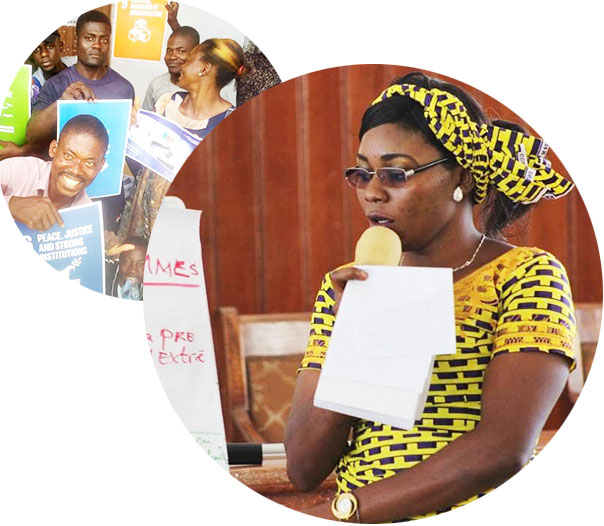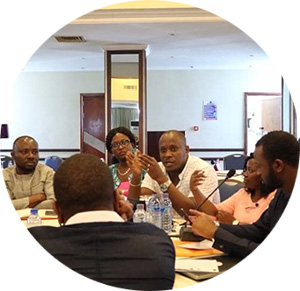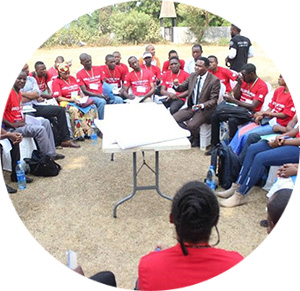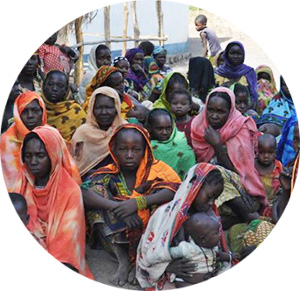
FACING POLICIES AND PRACTICES
Investing in youth is a prerequisite for building a sustainable future. To achieve this we work to overcome the issues preventing progress within our interconnected societies. It requires support to and the advancement of education, skills development, mobility and access to markets, youth participation and young people’s access to rights. Investing in youth means providing the right environment for young people to reach our fullest potential and positively impact our societies.
We are working to promote the participation of young people in the construction of the world we want. Our team is made up of representatives from our member organizations and youths active in their local communities who make their voices heard in their communities. We wish to highlight the vital role youth organisations in the development of young people in our continent.Governments, private sectors and institutions must increase investment in, facilitation of and support to Youth organizations multiple roles and contributions to society.
Recycling and Plastics
While some plastics can be recycled once or twice, others are hard to recycle for technical and economic reasons. For example, recyclers typically do not accept Styrofoam, as its lightweight foam structure makes it cumbersome to deal with. Polystyrene products, such as plastic forks and compact disc cases, however, are recyclable. Other common recyclable plastic goods include vinyl packaging, medicine bottles made of polypropylene, low-density polyethylene disposable drink cups and high-density polyethylene milk bottles. Everyday examples of goods made with recycled plastics include shampoo bottles, traffic cones, floor tiles and oil funnels.
ANYL4PSD organizes gatherings with leaders and decision makers to advance sustainable development agenda. We raise up the voices of youths, advocate increased youth participation in building peace and sustainable development. The main focus of our advocacy work is on the United Nations, as the resolutions and policies developed at the UN to establish a global benchmark for peace and sustainable development.
ANYL4PSD seeks to create global awareness of disaster risk reduction benefits and empower people to reduce their vulnerability. We campaign to create a Sustainable Peace Movement capable of mobilizing African States, the private sector, African artists and leaders, international organizations and actors of regional development, as well as NGOs and grassroots associations.
We support the Africa Union Campaign for Peace to raise public and youth awareness in particular, the role that each can play in building and consolidating peace and non-violence in everyday life.
We are committed to build strong coalitions and partnerships for peacebuilding and sustainable development among youth, civil society, private sector, governments and universities.
We promote the contribution of African culture to dialogue and reconciliation. This requires strengthening relations between Education and Culture to build effective education and training pathways. We promote scientific cooperation and diplomacy for the sharing of cross-border resources and raise awareness on the role of cosmogonies and traditional knowledge and indigenous know-how for sustainable development.
We promote the contribution of African culture to dialogue and reconciliation. This requires strengthening relations between Education and Culture to build effective education and training pathways. We promote scientific cooperation and diplomacy for the sharing of cross-border resources and raise awareness on the role of cosmogonies and traditional knowledge and indigenous know-how for sustainable development.
We advocate for the development of employment-friendly green and blue economies for all, especially the youth; the use of ICTs and the media and to promote models for the future of African youth; the role of girls and women in African society as guardians of values and promote gender equality among young people.
We train young people to influence discussions on peace, security and sustainable development at the national and international levels. Our training programs are designed to help people develop their skills to reach and train their peers but also other actors involved in building peace and sustainable development. Participants learn to understand and explain complex matters, to identify and map the relevant stakeholders, but also to master the means of communication suitable to each type of stakeholder.
We organize workshops and forums to exchange ideas, good practices and development of targeted policies and common strategies to tackle youth related issues. They are moments of creative thinking and generating ideas facilitated by a specific co-creation methodology that allows different actors to generate new approaches and strategies to tackle youth related issues. Such moments include a wide range of different actors and representatives from civil society (global and local), business community representatives (global and local), academia and the government.
Our activities include self-development accompaniment and psychological cares. We empower children, girls and women to play a leadership role and to lead and to participate in initiatives at communities/national/regional level such as early-warning, regional and national strategy development/dialogues and community policing.regional and national strategy development/dialogues and community policing.
We act for the creation of frames and networks that help link academics with policy-makers and practitioners, channels which could help direct research efforts to areas where vital gaps exist and where more research in peacebuilding and sustainable development is needed.
We identify the various stabilization peacebuilding and sustainable development vectors (local peace building and sustainable development youth organisations and activities, governance structures, schools, health centers, etc) by collecting data on a local level, partnering with local stakeholders (local authorities, civil society, youth organisations).
We design ideal monitoring tool for sustainable development goals in collaboration with national and local authorities, and including young people at the local level through systems of detection and signalization via mobile phones aiming at mobilizing youth to implement a tailored response in order to re-establish stability while ensuring a focus on the inclusion of women & children and facilitate knowledge and resource exchange.
We conduct and encourage studies that are embedded into a larger volunteering scheme, whereby volunteers from international non-governmental youth organisations join local organisations, and local volunteers go into existing structures of the former in another country, both intra- and intercontinental.
We are committed to create and provide open and accessible online courses on social and economic use of digital technologies and data. That includes the promotion of virtual exchange of good practices within the network and joint communication and exchanges among and between beneficiaries.
We promote digital skills at the earliest stages of education, focused on primary and secondary education, to unleash the potential of digital technology in the community through education, training and support programs for youth, including investments in digital connectivity, and to promote local, continental and intercontinental dialogue on digitalization in education, involving both public and private actors.
In addition to Children, youth and women who constitute our main targets, our activities target also indigenous people and migrants (Refugees and Internally Displaced Persons).We work hand in hand with several indigenous and migrants groups to improve their social situation and protect their rights. We are committed to involve and mobilize them in the implementation of sustainable development agenda.
A refugee is someone who has been forced to flee his or her country because of persecution, war or violence. A refugee has a well-founded fear of persecution for reasons of race, religion, nationality, political opinion or membership in a particular social group. Most likely, they cannot return home or are afraid to do so. War and ethnic, tribal and religious violence are leading causes of refugees fleeing their countries
An internally displaced persons, or IDP, are people who have been forced to flee their home but never cross an international border. These individuals seek safety anywhere they can find it—in nearby towns, schools, settlements, internal camps, even forests and fields. IDPs, which include people displaced by internal strife and natural disasters, are the largest group that UNHCR assists.
Indigenous Peoples face discrimination and marginalization. Indigenous women have lower levels of education and have a lower life expectancy. Globally, Indigenous people suffer higher rates of poverty, landlessness, malnutrition and internal displacement, and they have lower levels of literacy and less access to health services. Indigenous youth and women face multiple forms of discrimination because of their culture, class and gender. They are more like to die in child-birth and discrimination results in abuse by the authorities and people from other communities. We work with Indigenous Peoples to develop urgently needed to protect their lands, cultures and livelihoods. At the international level, Indigenous Peoples have made their voices heard and effectively lobbied governments.




